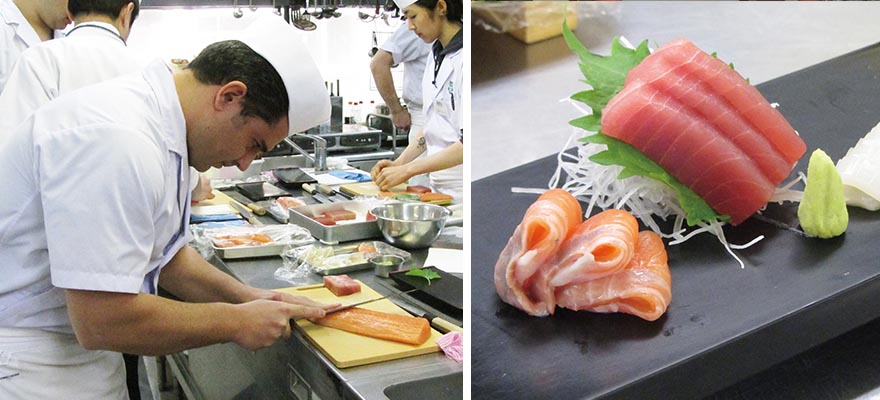Home > Highlighting JAPAN >Highlighting Japan April 2014>Washoku
Highlighting JAPAN
Washoku
Cutting Edge
Tokyo Sushi Academy trains sushi chefs for the world

Standing among his students at the Tokyo Sushi Academy, Master Chef Osamu Nishida lays down his knife and summarizes the day's objective: to skillfully arrange a small tray of sashimi in less than six minutes. Nishida's large group of students comprise a diverse array of chefs and aspiring chefs from countries such as Estonia, the Philippines, the U.S., Mexico, Portugal, Taiwan, Greece, the U.K. and Germany, telling evidence of sushi's popularity worldwide.
Founded in 2002, the Tokyo Sushi Academy claims to be Japan's foremost trade school for Edomae sushi, a traditional Tokyo style of sushi that focuses on nigiri-zushi, or raw fish placed on balled and vinegared rice. In contrast to the ten-year learning process typically required of sushi apprentices, the school offers condensed yet comprehensive training that includes a year-long sushi chef course and an eight-week diploma course, the latter popular among foreign students who can participate on a tourist visa, as well as Japanese students with overseas experience eager to return abroad with their newfound skills.
Hiromi Sugiyama, corporate officer and director of the General Affairs Department at the academy, says that Asia, and particularly Southeast Asian countries such as Thailand, Singapore and Viet Nam, is where sushi is rapidly growing in popularity. The school opened a branch in Singapore in April 2013, offering English instruction that was appreciated not only by local students but also foreigners wanting to learn about sushi in English. The school also operates two restaurants in Hong Kong and Guangzhou in China, which occasionally employ Tokyo Sushi Academy graduates in hands-on internships. Sugiyama adds that the academy also worked with the Ministry of Agriculture, Forestry and Fisheries (MAFF) to do a kitchen demonstration and workshop for an event in New Delhi and Mombai called 'Japanese Food Season–Oishii Japan in India,' which ran from October 2013 to February 2014 (Oishii is Japanese for 'delicious').
Not surprisingly, foreign interest in the academy has risen dramatically in recent years. Originally, the school could only teach non-Japanese-speaking students on a private-lesson basis, but in 2010 the school began offering classes using an interpreter to explain the teacher's instructions in English - and now over 100 foreign students have graduated.
One week away from his own graduation, Stavros Manousakis, an executive chef on leave from his job at a hotel chain in Rhodes, Greece, is about to join those ranks. His employer wants to open a sushi restaurant in his 500-room hotel and sent Manousakis to Japan to train. Manousakis says that in Greece sushi is "now starting to be popular," but at many places "it's not exactly sushi because people don't know" the proper techniques. Despite already having extensive experience as a chef, he says that "I had to forget what I knew from before … Now I learn the Japanese way."
Over its 13 years of operation, the Tokyo Sushi Academy has graduated more than 2,000 students, including some 500 Japanese students who now work all over the world. One such student is Hiroto Tanaka, who, after spending five years handling overseas sales for an electronic components company, quit his job and enrolled in the one-year sushi chef course. After graduation, he says that he quickly found work in a Japanese restaurant in Milan, Italy. "If you apply your Sushi Academy learning at work, I think you can get a job that would normally take three to five years to obtain."
Current student Akiko Toji, who had already spent eight years living in the U.S., is considering a similar future. Toji says she wants to work in Japan for a few years and then go abroad with the goal of "opening my own restaurant one day." Toji is symbolic of the growing trend in female students entering what has traditionally been a male-dominated profession – as the chef's profession still tends to be worldwide. Yet Sugiyama notes that in recent years the school has sometimes boasted as many as 50 percent female students.
As a healthy, delicious and fashionable food, the international appeal for sushi seems far from satiated. The Tokyo Sushi Academy is preparing its students to take on the world, one slice at a time.
© 2009 Cabinet Office, Government of Japan






